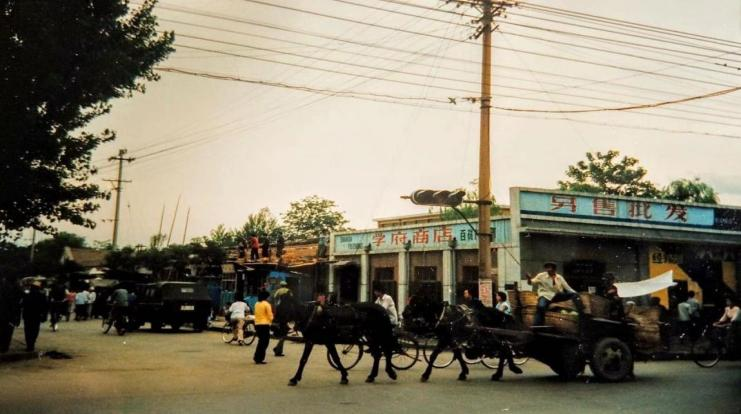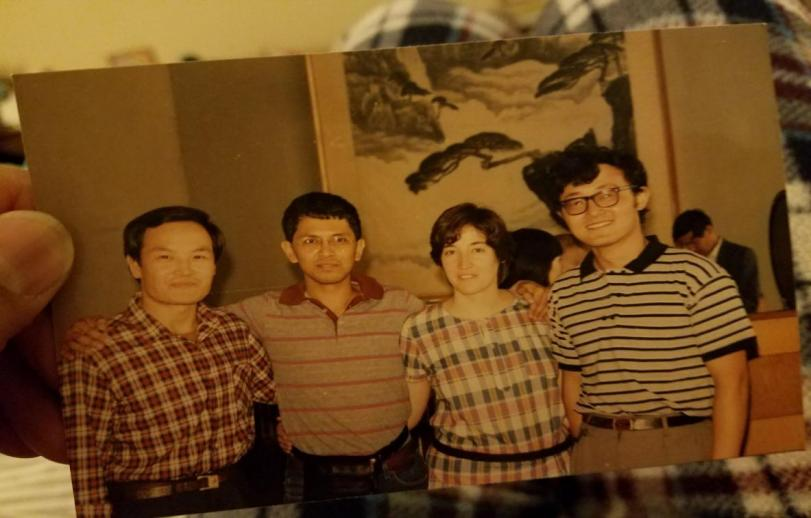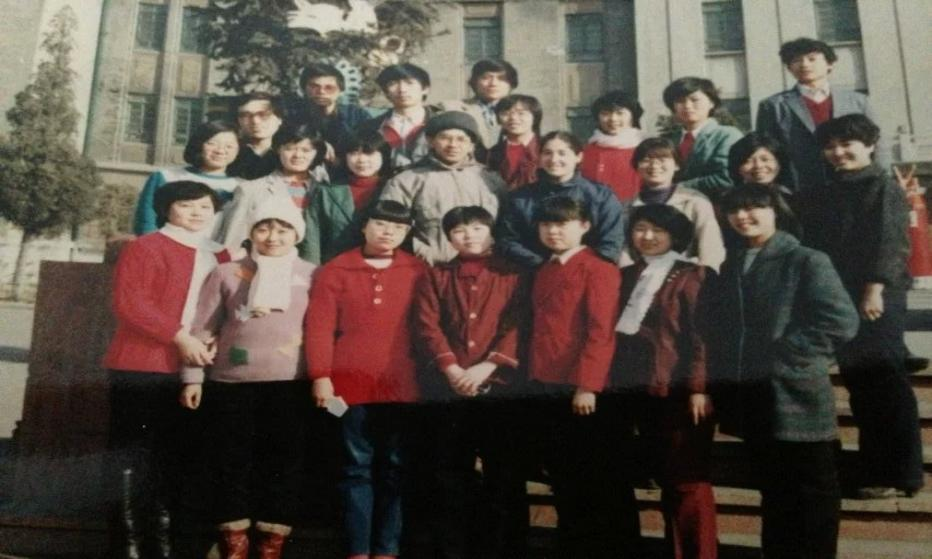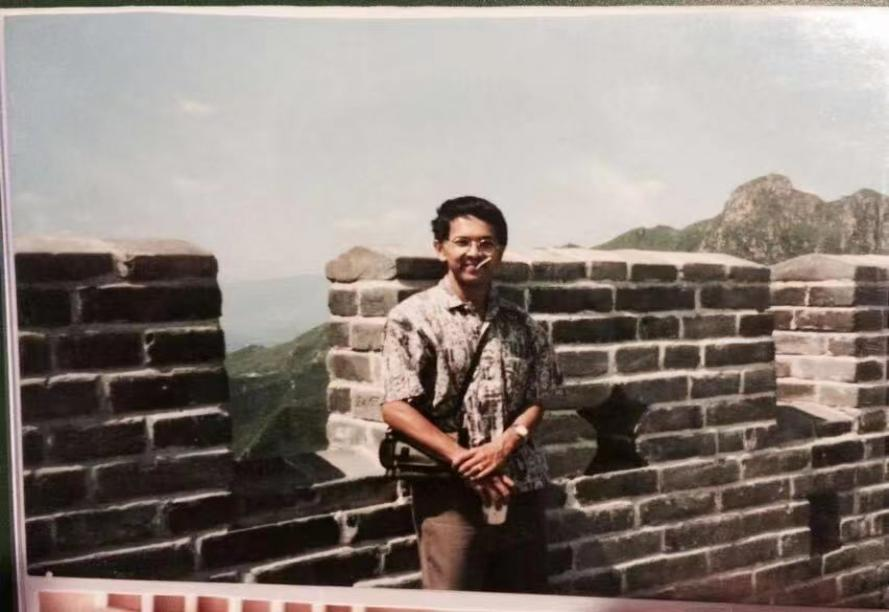

时间:2022-04-28
导语:
对于山西大学外国语学院英语专业1988、1989、1990这三届毕业生来说,有一个名字也许永远无法从他们的记忆中抹去,那就是克里希南·文卡特斯(Krishnan Venkatesh)。克里希南·文卡特斯毕业于剑桥大学英国文学专业,学术能力强,性情温和,聪明勤奋,富有魅力,循循善诱。他是山西大学外国语学院,即便不是唯一,但也绝对算是有史以来聘请到的最好的外国专家之一。在1986—1989年间,我很幸运有机会在他的指导下学习,也曾一度做他的中文老师,教他学习汉语,深受这位来自遥远国度的教授的影响。实际上,每当我们同学之间谈到他,许多人都有同样的感觉。他刚来山西大学工作的时候是26岁,把最好的年华献给了这里,为山大的发展贡献了自己的力量。我认为他在山大的奉献对我们来说是一种幸运,应该被永远铭记。几天前,我冒昧地请文卡特斯教授写一写他在山西大学的工作经历,他毫不犹豫地答应了。我知道他很忙,但他是一个永远不愿让别人失望的人,向来如此。他连夜创作,完成了“My Life at Shanxi” (《山西情缘》)这篇文章,作为献给山西大学120周年校庆的贺礼。
山西情缘
克里希南·文卡特斯
1986年至1989年,我在山西大学度过了意义非凡的三年。我永远不会忘记那段时光以及在那里结交的友人。

26岁时,我和妻子弗吉尼亚·蒂尔尼(Virginia Tierney)一起来到了山西大学。我受聘为外国专家,主要教授写作和西方文化,而她则担任外语教师。1982年,我毕业于剑桥大学。之后到1986年这段时间,我在德国为一位研究莎士比亚的教授做博士后研究助理。这份工作让我有机会在阿尔伯克基的新墨西哥大学工作了一年,在那里我遇到了弗吉尼亚·蒂尔尼,并了解了圣塔菲市的圣约翰学院,1989年结束山西大学外教工作返回美国之后我就一直在这所学院工作。

在山西大学,我主要给1984级和1985级的学生上课。作为一名写作教师,我非常认真地对待我的工作。我一周有四节课,每节课后我都会给学生布置作业,然后一丝不苟地批改完四个班级的成堆的作文。现在,我现在还留着其中一些学生的作文和几份当年的成绩单。对于“西方文化”这个话题,我的理解比较广泛。在那三年当中,我做过关于英美诗歌、西方哲学史、工业革命以及其他西方文化方面的讲座;我还开设过小型讨论课,称其为“研讨会”,每周两次,大约12名学生每次都准时参加,大家会一起研究莎士比亚戏剧和简·奥斯汀的《傲慢与偏见》( Pride and Prejudice );我还开展过有关莎士比亚《哈姆雷特》的系列讲座,为期一年。去中国的时候,我带了很多书籍,几乎算得上是一个小型图书馆了。学生们经常来借书并与我讨论。我的住处每天都会有很多渴望讨论西方书籍、思想和生活的访客。我也带过研究生,有高健教授和杨德友教授门下的高徒。由于我曾在不同的国家生活过,而且母亲是中国人,学生和同事们都觉得与我交谈很亲切。我总会热情接待我的访客,开心地与他们谈论书籍。能够与朋友分享心爱的书是幸福生活的要义!

我妻子蒂尔尼(Ms. Tierney)教授的是口语课,她也是英语俱乐部活动的积极参与者,主持过电影讨论,还有童话故事表演。她还是一位绝好的厨师,热心地为那些家境困难的学生们提供美食。我们每个月都会去一趟设在北京的英国使馆文化教育处,带几卷电影胶片回去,之后就在英语俱乐部放映。在北京,我们还能买到一些当时太原没有的比如奶酪之类的西方生活必需品。

当时,山西大学的学生大多是第一代大学生,家境比较贫寒。能被大学录取本身就可以说是英雄壮举了,是智慧加上超常勤奋努力的结果。他们都很单纯,相比于今天的学生,甚至可以用天真来形容。当时没有互联网,也没有机会看国际电视节目,所以他们很少有机会练习英语或了解其他国家。在那个年代,跟外教学习是他们了解外面世界的最佳契机。虽然与今天的学生相比,他们可能看起来并不成熟,但他们非常重视学习的机会,并不会痴迷于赚钱和谋求事业成功。那个时代的学生更富理想主义,他们对伟大的思想和探索生命的意义非常感兴趣。这就是为什么我上很多文学和哲学课的原因。在那时,我结交了许多密友。对生活意义的探索、对美和诗歌的热爱以及对伟大思想的热情把我们联系在了一起,而微信这个神奇的软件又让我们在几十年之后还能够保持联系。
关于那些年,我甚至可以写一本小书了。有哪些记忆至今仍然历历在目吗?躺在北京开往太原的火车上,一觉醒来,看到连绵数英里的向日葵;空气中夹杂着挥散不去的硫磺味,连带着书和衣服也沾染了一层薄薄的燃煤灰;外语系楼外的树,花朵早已盛开(可能是山楂树?);坐在公寓楼梯上,看着窗外飞舞的雪花,讨论着济慈;走在桌子中间的地毯上,上面零星散落着南瓜籽壳;待在学生宿舍里,和他们一起吃着鹌鹑蛋——回想起来我们一起吃过不知多少次饭了。这些回忆编织成就了我们生动而永恒的友谊:何宝林、王大鹏、任志军、王咏波、张霞、代显梅、纪墨芳、田安稻、李红丽、闫玉华……还有很多名字……我深深地记得他们所有人,有时还会想起一些我们之间具体的对话。
三十年过去了,我知道一切都变了。太原早已焕然一新了,如今的年轻人和那时的年轻人已经大不相同了——当年的学生们现在都已成了受人尊敬的长者。但那些日子的记忆将永远存在,因为这么久以来,当我们都准备好了,一旦时机成熟,就可以再次相见,一起分享各自不同的世界。那时的我们正当年少、内心真挚、求知若渴,交三两好友,恰逢其时。
美国 新墨西哥州 圣塔菲
2022年4月9日
附:克里希南·文卡特斯教授简介

1960年,克里希南·文卡特斯出生在马来西亚,父亲属于南印度婆罗门阶级,母亲是中国客家人。之后,他在英国长大,大学就读于剑桥大学麦格达伦学院,英国文学专业,并荣获一等奖。毕业后,他去了德国明斯特大学,成为研究莎士比亚的杰出学者马文·施佩瓦克教授的研究助理,做了四年多的莎士比亚研究。1986—1989年,在山西大学外语系教授文学和哲学。克里希南·文卡特斯教授的个人经历和学术背景使得他非常适合成为各种文化之间的 “桥梁”。1989年以来,他一直在美国新墨西哥州圣塔菲市的圣约翰学院任教,教授两门西方名著课程。同时,他是独特的“东方古典文学名家项目”的始创者之一,并且在该领域深耕20余年。该项目包括深入研究中国、印度和日本的经典文学作品,沉浸式阅读古汉语和梵文,从而更深刻地理解原文。文卡特斯曾教授该项目的多门课程,包括中文和梵文。2003—2008年,他担任圣约翰学院研究生院院长。与《斐德罗篇》中的苏格拉底一样,他对写作的价值持怀疑态度,因此也不赞赏出版。他坚信对话是最有力的学习模式,是“内心的写作”。圣约翰学院一直是他理想的学术乐园,因为在这个纯粹的学习环境中,大家都相信讨论的力量。近十年间,克里希南·文卡特斯教授曾在印度工作了约两年时间,致力于研究佛教的巴利大藏经、日本哲学家道元以及约翰尼斯·开普勒的数学书籍。床头摆放的作品,出自经年相伴的老友,有蒙田、乔叟、诗人托马斯·哈代、布莱克、华兹华斯、庄子、契诃夫、托尔斯泰、奥斯丁、巴尔扎克和拉克斯尼斯——美好的陪伴。当然,莎士比亚的作品更是常伴其左右。
附英文原文:
A Foreign Expert's View, 1986-89
Krishnan Venkatesh
The three years I spent at Shanxi University, 1986-89, were transformative for me. I will never forget my time there, or all of the friends I made there.
I was 26 years old, and was accompanied by my wife at the time, Virginia Tierney. I was hired as a Foreign Expert, she as a Foreign Teacher. My job description stated that I was to teach Writing and Western Culture. I had graduated from Cambridge University in 1982, and between 1982 and 1986 I worked as a postdoctoral research assistant for a Shakespeare professor in Germany. That job took me for a year to the University of New Mexico in Albuquerque, where I met Virginia Tierney and learned about St. John's College, Santa Fe, where I have been since 1989.
At Shanda, I taught mostly the classes that graduated in 1988 and 1989. I took my job as a teacher of writing very seriously and each week I would work meticulously through a pile of essays from four classes. Some of these essays I still have with me, as well as some grade sheets from those days! The topic of "Western Culture" I understood very broadly, and over three years I gave lectures on British and American poetry, the history of Western philosophy, the Industrial Revolution, and other aspects of Western culture. I also offered small discussion classes, called "seminars," in which about 12 students regularly attended to study Shakespeare plays and Jane Austen's "Pride and Prejudice" twice a week. I also gave a year-long lecture series on Shakespeare's "Hamlet." I came to China with a small library, and students often came to borrow books and talk about them with me. Every day there would be visitors eager to talk about books, ideas, and life in the West. I also taught graduate students, the protégés of professors Gao Jian and Yang Deyou. Since I had lived in various countries, and since my mother was Chinese, students and colleagues found it very easy to talk with me. Visitors were always welcome, and I have always been happy to talk about books. Being able to share beloved books with friends is one of the ingredients of a happy life!
My wife at the time, Ms. Tierney, taught conversation classes and was also a very lively participant in English Club activities, leading discussions of movies as well as performing fairy tales. She was also an excellent chef and eager to feed the poor students. For English Club, we would go once a month to the British Council in Beijing and carry back film reels to project. From Beijing we would also get some essentials of Western life that were not obtainable in Taiyuan then, such as cheese.
Shanxi students in those days were often first-generation university students, and from poorer backgrounds. Getting accepted into university was itself a heroic endeavor, the fruit of intelligence and hard, hard work. They were also innocent, even naïve compared to students of today. There was no internet and no access to international TV shows, so they had had very little opportunity to practice English or learn about other countries. In those days, foreign teachers were their best chance to do those things. Although they might have seemed unsophisticated compared to today's students, they took very seriously their chance to study, and they were not all obsessed with making money and success in careers. Students of those days were more idealistic, and very interested in big ideas and in finding meaning in life. This is why I was able to have so many classes in literature and philosophy. I made many close friends from those days because we were bound together by our search for meaning, by love of beauty and poetry, and by a passion for big ideas. The miracle of WeChat means that we have been able to stay in touch.
I could write a small book about those years. What were some of my vivid memories? Waking up in the morning on the Beijing-Taiyuan train to see miles and miles of sunflowers; the permanent sulfurous smell of coal-burning, the thin coating of coal dust on my books and clothes; the flowering trees (were they hawthorn?) outside the Foreign Languages School building; sitting on the floor in my apartment discussing Keats while snow was falling outside; walking through a carpet of pumpkin-seed shells between desks; eating preserved quail eggs with my students in the dormitories -- above all, the hundreds of meals we had together. Such vivid and eternal friendships were formed then: He Baolin, Wang Dapeng, Ren Zhijun, Wang Yongbo, Zhang Xia, Dai Xianmei, Ji Mofang, Tian Andao, Li Hongli, Yan Yuhua...There are many other names... I remember all of them fondly. From time to time I also remember specific conversations.
Thirty years later, I know that everything has changed, that Taiyuan would be unrecognizable to me, and that young people today are very different from young people back then -- who are now revered elders. But the memory of those days will remain, as of a time when we were all ready, all ripe, to meet each other and share our different worlds. We were young, our hearts were open, and our minds were eager to learn. It was the best way to make friends.
Santa Fe, New Mexico,
April 9, 2022
英文稿件及图片来源:克里希南·文卡特斯(Krishnan Venkatesh)
导语作者:闫玉华(1989届英语专业毕业生,现为山大外院教师)
中文译者:2020级英语笔译 冯聪聪 白如英
文稿审校:荆素蓉